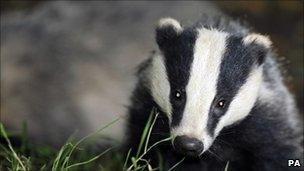Wales badger cull: Trust appeals to AMs before vote
- Published

Plans for a cull were revived earlier this month
The Badger Trust has appealed to assembly members to oppose plans for a cull of badgers in west Wales.
AMs will vote on Wednesday on a legislative order allowing a cull in north Pembrokeshire, and parts of Ceredigion and Carmarthenshire.
In an open letter the trust tells AMs the order "flies in the face of the best, peer-reviewed science".
The rural affairs minister said her decision was based on "substantial scientific evidence".
Elin Jones responded to the letter by reiterating her commitment to its latest cull plans.
Shelved eight months ago when the Badger Trust won a challenge in the Court of Appeal, the plans were revived earlier this month.
Rural Affairs Minister Elin Jones said on 9 March she had decided to push ahead after fully considering the evidence.
Ms Jones also announced new controls to deal with TB in non-bovines, which include camelids - such as llamas and alpacas - goats and deer. Like cattle, they will be slaughtered if found to be infected by TB after tests.
If the order is not opposed by AMs it will come into force on 31 March, otherwise there could be a debate and a vote in the Senedd.
At the time the Badger Trust said it was "deeply disappointed" with the decision and would be seeking legal advice.
The letter, signed by Steve Clark of Badger Trust Cymru, asks AMs not to "take a step too far".
It claims bovine TB levels in Wales are falling, dramatically in some parts, and that vaccination trials are showing distinct promise.
The letter adds that culling badgers is likely to increase bovine TB in the short term and that it increases the prevalence of the disease in the surviving badgers.
"Culling badgers is difficult, unpopular, expensive. At best, cost savings will be marginal," it says.
"This is the wrong measure at the wrong time. The proposal is controversial, fraught with difficulties. Most of the badgers killed will be disease free. Your assembly's rigorous and comprehensive cattle-based measures are working. Give them more time."
In response to the letter the assembly government referred to a statement issued by Rural Affairs minister Elin Jones when the cull plan was revived.
In the statement Ms Jones said: "I am aware that this decision will cause some people genuine concern, but it is a decision that I have taken based on full consideration of the matter, including the substantial scientific evidence available and after careful consideration of the responses to the public consultation.
"We must continue to pursue a comprehensive approach towards the eradication of bovine TB from Wales."
'Downward trend'
Meanwhile pro-vaccination group Pembrokeshire Against the Cull (PAC) has welcomed the latest bovine TB statistics issued by Defra which it said shows a decline of 45% in cattle slaughtered due to bovine TB in west Wales over the last two years.
Spokesman Dr Gavin Wheeler said: "The stricter testing regime and improved cattle control measures introduced by the Welsh Assembly Government are having a major impact in reducing the number of cattle being slaughtered due to bovine TB.
"This is a clear downward trend which should not be put at risk by a badger cull which we believe could cause an increase in bovine TB cases in our area."
The Welsh Assembly Government said any reduction in TB statistics was welcome but it would be "premature" to suggest a turning point has been reached in Wales.
"Statistics need to be treated with caution, and while we monitor statistics monthly, figures need to be analysed over time to observe a trend," said a spokesman.
It said the number of new TB breakdowns in the old Dyfed area between January and November 2010 was 456 compared with 565 for the same period in 2009 - a 19% decrease.
But within the intensive active area in 2010, there were 79 new TB breakdowns compared with 55 in 2009, a rise of 44%.
However Stephen James, deputy president of the NFU Cymru, which has welcomed the assembly government's plans for a cull, said vaccination was not a viable option in the Intensive Action Area in west Wales.
"Vaccination prevents disease, it does not cure it," he said. "We know that there is a significant reservoir of disease within the badger population of the IAA."
- Published10 March 2011
- Published9 March 2011
- Published13 July 2010
- Published1 December 2010
- Published19 November 2010
- Published15 September 2010